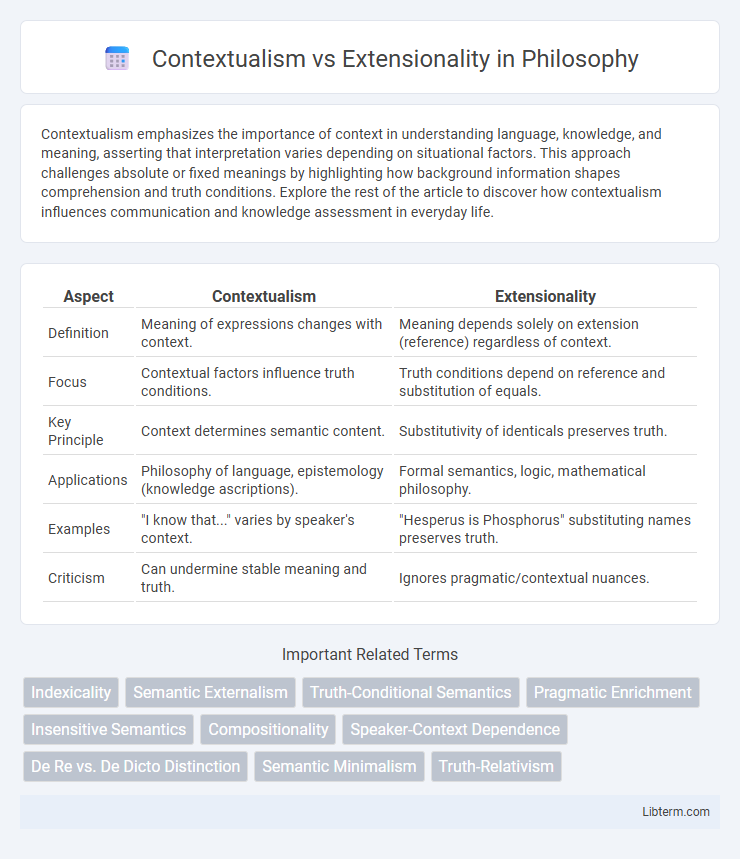Contextualism emphasizes the importance of context in understanding language, knowledge, and meaning, asserting that interpretation varies depending on situational factors. This approach challenges absolute or fixed meanings by highlighting how background information shapes comprehension and truth conditions. Explore the rest of the article to discover how contextualism influences communication and knowledge assessment in everyday life.
Table of Comparison
| Aspect | Contextualism | Extensionality |
|---|---|---|
| Definition | Meaning of expressions changes with context. | Meaning depends solely on extension (reference) regardless of context. |
| Focus | Contextual factors influence truth conditions. | Truth conditions depend on reference and substitution of equals. |
| Key Principle | Context determines semantic content. | Substitutivity of identicals preserves truth. |
| Applications | Philosophy of language, epistemology (knowledge ascriptions). | Formal semantics, logic, mathematical philosophy. |
| Examples | "I know that..." varies by speaker's context. | "Hesperus is Phosphorus" substituting names preserves truth. |
| Criticism | Can undermine stable meaning and truth. | Ignores pragmatic/contextual nuances. |
Understanding Contextualism: A Brief Overview
Contextualism asserts that the truth conditions of knowledge claims depend on the context in which they are expressed, emphasizing the variability of standards and criteria based on situational factors. This approach contrasts sharply with extensionality, which holds that the meaning of expressions is fixed and context-independent, focusing on truth-value in all contexts. By analyzing how conversational contexts influence the semantics of statements, contextualism provides a more dynamic framework for understanding language and knowledge attribution.
Defining Extensionality in Philosophy
Extensionality in philosophy refers to the principle that expressions are interchangeable if they refer to the same extension or set of objects, emphasizing the truth conditions of statements based solely on their referential content. This concept contrasts with contextualism, which posits that meaning and truth values can shift depending on linguistic or situational context. Defining extensionality involves understanding how the identity of referents determines logical equivalence without regard to the variability of speaker intentions or contextual nuances.
Key Differences Between Contextualism and Extensionality
Contextualism asserts that the truth value of statements depends on the context in which they are uttered, emphasizing the role of speaker intentions and situational factors. Extensionality holds that expressions can be replaced by others with the same reference without changing the truth value of statements, focusing on constancy of meaning across contexts. Key differences lie in contextualism's sensitivity to varying contexts versus extensionality's strict adherence to referential stability in logical and linguistic analysis.
Historical Perspectives on Contextualism and Extensionality
Historical perspectives on contextualism and extensionality trace back to early analytic philosophy, where Frege's sense and reference distinction laid the groundwork for extensional semantics. Contextualism emerged as a response, emphasizing the role of speaker context and pragmatic factors in meaning, particularly influenced by Wittgenstein's later philosophy and ordinary language analysis. These debates shaped modern theories in semantics and pragmatics, highlighting the tension between context-independent truth conditions and context-sensitive interpretations.
Major Debates Surrounding Contextualism vs Extensionality
Major debates surrounding contextualism versus extensionality center on whether the truth conditions of expressions depend on context or remain fixed across contexts. Contextualists argue that meaning varies with linguistic or situational factors, impacting reference and truth-value, while extensionalists maintain that expressions have stable, context-independent extensions. This dispute affects interpretations in epistemology, semantics, and philosophy of language, particularly regarding indexicals, propositional attitudes, and modal contexts.
Applications in Language and Semantics
Contextualism in language theory emphasizes that the meaning of expressions varies according to the context of utterance, enhancing natural language understanding in AI and conversational agents by adapting interpretations dynamically. Extensionality provides a framework for evaluating expressions based on their reference or truth conditions, crucial in formal semantics and logic programming for handling precise meaning and truth-functional operations. Applications in computational linguistics leverage contextualism to model pragmatics and speaker intention while relying on extensionality to ensure consistency and compositionality in semantic parsing and knowledge representation systems.
Implications for Logic and Mathematics
Contextualism challenges traditional extensionality by emphasizing that the truth value of expressions depends on the context of evaluation, impacting logical systems and mathematical frameworks that assume fixed referents. In mathematics, this undermines classical extensional equality, prompting the development of intensional logics and type theories to handle context-sensitive interpretations. The shift influences proof theory and model theory by integrating context-based semantics, thereby altering foundational aspects of logical inference and mathematical truth.
Criticisms and Challenges of Each Approach
Contextualism faces criticism for potentially leading to semantic indeterminacy, as meaning shifts with context, making it difficult to establish stable truth conditions. Extensionality is challenged by its inability to account for the nuances of meaning in natural language, particularly in intensional contexts where substitutions of co-referential terms fail. Both approaches struggle with balancing precision and flexibility, generating ongoing debates about their applicability in linguistic semantics and philosophy of language.
Contextualism and Extensionality in Contemporary Research
Contextualism in contemporary research emphasizes the significance of linguistic context in determining meaning, challenging the fixed truth conditions assumed by classical semantics. Extensionality, by contrast, maintains that expressions have consistent references across contexts, facilitating logical analysis and formal semantics. Recent studies explore how integrating contextualist insights can refine extensionalist frameworks, enhancing the precision of natural language understanding models.
Future Directions: Integrating Contextualism and Extensionality
Future directions in the philosophy of language increasingly explore integrating contextualism and extensionality to reconcile semantic precision with pragmatic flexibility. Advances in cognitive science and artificial intelligence highlight the need for models that balance context-dependent meaning with stable truth-conditions in natural language understanding. This integration aims to enhance linguistic theory and improve computational semantics by combining the strengths of both approaches in real-world communication settings.
Contextualism Infographic

 libterm.com
libterm.com